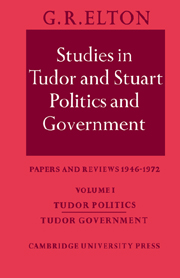Book contents
- Frontmatter
- Contents
- Preface
- Acknowledgments
- Abbreviations
- 1 The Terminal Date of Caesar's Gallic Proconsulate
- I TUDOR POLITICS
- II TUDOR GOVERNMENT
- 13 The Problems and Significance of Administrative History in the Tudor Period
- 14 The Rule of Law in Sixteenth-Century England
- 15 State Planning in Early-Tudor England
- 16 Henry VII's Council
- 17 Government by Edict?
- 18 Why the History of the Early Tudor Council Remains Unwritten
- 19 Henry VIII's Act of Proclamations
- 20 The Elizabethan Exchequer: War in the Receipt
- General Index
- Index of Authors Cited
13 - The Problems and Significance of Administrative History in the Tudor Period
Published online by Cambridge University Press: 03 February 2010
- Frontmatter
- Contents
- Preface
- Acknowledgments
- Abbreviations
- 1 The Terminal Date of Caesar's Gallic Proconsulate
- I TUDOR POLITICS
- II TUDOR GOVERNMENT
- 13 The Problems and Significance of Administrative History in the Tudor Period
- 14 The Rule of Law in Sixteenth-Century England
- 15 State Planning in Early-Tudor England
- 16 Henry VII's Council
- 17 Government by Edict?
- 18 Why the History of the Early Tudor Council Remains Unwritten
- 19 Henry VIII's Act of Proclamations
- 20 The Elizabethan Exchequer: War in the Receipt
- General Index
- Index of Authors Cited
Summary
During the past sixteen years ‘administrative history’ seems to have come and gone as a term of distinction in the historical study of Tudor England. In the later 1940s there were a number of scholars newly aware of the vast wealth of government records in the English archives and enormously impressed by the achievements of the medievalists – of Tout and his school – who deplored the absence of comparable studies for the post-medieval period and, for a time, came to seek salvation in an ever more stringent and particular investigation of the processes of government. But that phase did not last long. Now it can be said by Joel Hurstfield, himself a notable contributor to that flowering of administrative history, that ‘we have passed beyond recall the stage when the machinery alone, however intimately understood, can answer the questions’. The study of social history is all the rage now, by which is meant the history of a given society in its various aspects and manifestations – or rather, whatever may in fact emerge from that awesome ambition. Fashions change, and nowadays they change pretty rapidly; but one need not regret that not-so-distant dawn or believe that the evening has yet come. Let it be made clear, however, what is meant, or should be meant, by administrative history. Certainly this involves the analysis and description of past administrative processes, the discovery of principles implicit or explicit in the conduct of government, and an understanding of the manner in which the theoretical mechanism operated in practice.
- Type
- Chapter
- Information
- Studies in Tudor and Stuart Politics and GovernmentPapers and Reviews 1946–1972, pp. 249 - 259Publisher: Cambridge University PressPrint publication year: 1974



